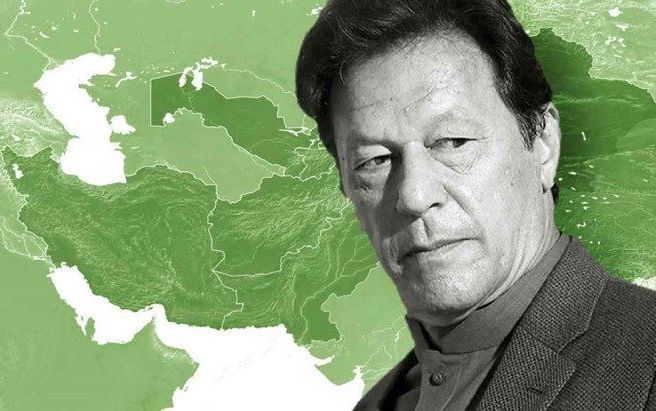Pakistan is setting new growth targets by establishing economic ties with Central Asia and pursuing a regional prosperity route that passes via a peaceful Afghanistan.
The country has started on a path where all roads of regional integration lead to development, after a major change from geo-strategic to geo-economic policies in accordance with Prime Minister Imran Khan’s vision.
To see a significant economic upturn in the near future, the administration is concentrating on regional connection with five landlocked Central Asian nations — Uzbekistan, Tajikistan, Turkmenistan, Kyrgyzstan, and Kazakhstan. Peace in Afghanistan, on the other hand, has been dubbed the “most important element” in realising such a vision of wealth.
Imran Khan has said many times that Pakistan is the “most interested” country in the restoration of peace in Afghanistan for its own purposes.
“Pakistan is concerned for peace in Afghanistan because the country’s economic strategies greatly depend on it, ” he said, in a recent interaction with the visiting Afghan journalists in Islamabad.
In addition to benefiting from Pakistan’s Gwadar seaport, a stable Afghanistan, he added, might serve as a gateway for Pakistan’s commerce route to Central Asian nations.
On February 2, 2021, Pakistan, Uzbekistan, and Afghanistan agreed on a timeline for the building of a 573-kilometre highway connecting Mazar-e-Sharif and Peshawar through Kabul.
The $5 billion projects will connect Pakistani seaports on the Arabian Gulf to Uzbekistan while also continuing Afghanistan’s gradual inclusion into the Central Asian economic system.
With an annual transit capacity of up to 20 million tonnes of freight transportation, the new route will enhance connectivity.
In a virtual meeting on April 14, Prime Minister Imran Khan and Uzbek President Shavkat Mirziyoyev backed the construction of the ‘Termez–Mazar-e-Sharif–Kabul–Peshawar’ railway line, describing it as a crucial initiative to establish connectivity from Central Asia to the Arabian Sea via Afghanistan and Pakistani seaports of Karachi, Gwadar, and Qasim.
During a recent visit to Uzbekistan in July, Prime Minister Khan said that the success of Pakistan’s commercial partners will be determined by how fast the two countries could link.
He described the trans-Afghan railroad project as Uzbekistan and Pakistan’s most significant endeavour. “For Pakistan, it connects us to Central Asia, to Uzbekistan which is the biggest of the Central Asian republics and beyond,” he said.
The China-Pakistan Economic Corridor’s regional connection also holds enormous promise for the whole Central Asian region in terms of transportation, fibre optic cable, energy pipelines, and investment possibilities in Special Economic Zones.
The prime minister spoke about the situation in Afghanistan in his address to the leaders attending the ‘Central and South Asia Summit on Opportunities and Challenges’ in Tashkent in July, where he said Pakistan wanted a political settlement in the neighbouring country for “mutually beneficial” connectivity between Pakistan and Uzbekistan, as well as other Central Asian countries.
Fawad Chaudhry, Afghanistan’s Minister of Information and Broadcasting, has similarly connected regional connections to the country’s long-term stability.
“Pakistan is desirous of durable peace in Afghanistan, and is making all possible efforts in this regard,” he said in Tashkent, expressing hope that regional connectivity would prove as a harbinger of progress for the entire region.
Following their meeting in Tashkent, Prime Minister Imran Khan and Uzbek President Islam Karimov stated their intention to establish a rail service from Gwadar to Tashkent and truck service from Karachi to Tashkent, according to Fawad.
According to Commerce Adviser Abdul Raza Dawood, Pakistan is seeking to expand trade with neighbouring Afghanistan and Central Asian nations in order to diversify commerce beyond the main players.
The US departure from Afghanistan offers peace and gives Pakistan the chance to expand trade with its neighbour, which is located at the crossroads of South and Central Asia.
To expand its industrial foundation, Islamabad will profit from increased commerce with Central Asian countries that are rich in energy resources.
Pakistan thinks that a political solution in Afghanistan is the most important element in ensuring the success of its economic initiatives. Many nations will gain from the South Asia-Central Asia connection, according to experts. The railway line from Mazar-e-Sharif to Peshawar, which runs via Kabul, will cut Russia’s north-south route by 600 kilometres. China’s commerce with South Asia and East Africa has seen similar reductions in distance and shipping times.
The United States, Uzbekistan, Afghanistan, and Pakistan announced on July 15 that they had reached an agreement in principle to create a new quadrilateral diplomatic platform aimed at improving regional connectivity. With ‘peace’ and ‘regional connectivity as key components of its geo-economic strategy, analysts are certain that Pakistan will make fast progress in a variety of areas — up to Central Asia and beyond.










